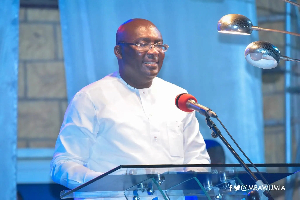The supremely open and important statement by Ghana's Vice President, lawyer Alhaji Aliu Mahama, that "Article 39 of the Constitution enjoins the State to take the necessary steps to encourage the integration of appropriate customary values into the fabric of national life through formal and informal education as well as the conscious introduction of cultural dimensions to relevant aspects of national planning" and that "the State was also required to ensure that appropriate customary and cultural values are adapted and developed as an integral part of the growing needs of society, while traditional practices, which are injurious to the society are abolished" throw more light on the Ghanaian culture and her development process as the on-going culture-development debate rages on Africa-wide.
Mahama also opens up the deep relevance of both the Africanists of the Internalist School (Africanist-Internalist) arguments and the African Renaissance process advocates that the African culture should be hugely factored in in the continent's development process in order to make the continent's development holistic and closer to Africans because of the long-running damages and distortions done by colonialism.
Africa's development process should move around the continent's innate cultural values and its mixture both with her colonial legacies and the enabling asparts of the global culture. Since independence from British colonial rule, Ghana, like the rest of other African states, has not integrated or mixed her innate or customary (as the lawyers call African indigenous cultural values) values in her development paradigms or policies. The reason for the supreme need to let Ghanaian/African culture drive her development process is that armed with their so-called "civilising mission," which generally saw African values erroneously as "primitive" and need to be "civilised" and "developed," the European colonialists wrongly imposed their values on Africa without considering the centuries old well tried and tested African values in their so-called "civilising process."
In the process, African cultural institutions, which have been superbly developed over centuries, were ignored, abused, bastardised and alienated, and in the process made the African continent the most dominated area in the world by foreign development values, as Ghana's Dr. Y.K. Amoako, the former chief executive secretary of the Addis Ababa-based UN Economic Commission for Africa, has observed and the much enlightening cultural relativity, which says everyone's culture is importance in their own development process rights, has exposed. After independence African elites - lazy, weak, and hooked on the diet of foreign development pradigms of the colonilists, mostly for their own material gains against the overall development of their people - continued with the imposed colonial development paradigms, and this is partly responsible for the continent's agonies which have remarkably come in the forefront of the global communities.
The leading Africanist-Internalist Dr. George Ayittey, of the American University in Washington D.C., in a note to me stated that, "Elsewhere, we, African ELITES, denigrated our own indigenous institutions and even destroyed them. Free village MARKETS, for example, were in existence for centuries before the white man set foot on the continent. In post colonial Africa, we never build one single market for the people. We built super-markets in the urban areas for ourselves. As for our indigenous markets, we denounced them as "Western capitalist institutions" and destroyed them. In the 1980s, Jerry Rawlings was blowing up and burning down these indigenous markets. Economic stupidity ran amok."
Over the years, there have been heated arguments as to who should be blamed for Africa's agonies as if Africa is a helpless baby: Is agonies due to external factors or internal factors, or both, as African Renaissance process advocates such as South Africa's President Thabo Mbeki say. Explained Dr. Ayittey in a note to the Africanist-Internalist community, "There are two schools of thought on the causes of Africa's ills. There are the externalists who blame external factors (Western colonialism, the slave trade, imperialism, unjust international economy system, the World Bank, IMF, etc). For more than 40 years, this orthodoxy held sway in Africa and is subscribed to by African leaders (naturally, since it absolved them of any responsibility for the mess in Africa), the African Union (AU) and African intellectuals, such as Professor Ali Mazrui. This school of thought seeks external solutions -- more Western aid for Africa, debt relief, incessant appeals to the international community to help solve Africa's problems. Then there is the internal school of thought, which maintains that, though external factors have had a role play, the internal factors are equally if not more important in causing the ruination of Africa. These internal factors include bad leadership, bad governance, corruption, capital flight, military vandalism, political repression, economic mismanagement, senseless civil wars, etc. As such, there is a need to search for INTERNAL solutions. Africa must put its own house in order and must seek African solutions for Africa's problems because the destiny of Africa lies in its own hands."
Mahama's acceptance that certain Ghanaian values are "injurious" to her development process gives credence to many an Africanist-Internalist and the African Renaissance process observations that there some deadly inhibitions within the African culture, just as there are many remarkable positive values, that need to be refined or destroyed in order to smooth the development process. Much of the inhibitions or "injurious" aspects of the Ghanaian/African culture have not been addressed and grown over the years largely because the colonially-imposed values suppressed or dominated the Ghanaian/African ones and so did not allow African values to grow or metamorphosis so as to show both the good and the bad parts and the process weed out the "injurious" or the destructive values in the course of the continent's development process.
Coming on the heels of Mahama's enlightening and historic culture-development statements is Alhaji Saddique Boniface, Ghana's Northern Regional Minister, observations of the growing phenomenon in his region and some Ghanaian schools where students consult the largely self-"injurious" juju-marabou mediums and its subsequent disaster for Ghana since "such negative practices had the tendency of moving the nation backward since it de-emphasizes hard work" and reason. This reveals one aspects of the "injurious" parts of the culture stifling the development process. Saddique may actually be talking from the knowledge that the Northen is a region in Ghana that is perhaps the most backward and developmentally weak because of certain "injurious" or deadly inhibiting cultural practices, and which has made this area Ghana's most poverty-stricken despite long-running government assistance since inependence from colonial rule.
By accepting and openly discussing the inhibiting or "injurious" aspects of the Ghanaian culture in her development process, Mahama, as part of the Ghanaian elite, has opened the floodgates for credible acceptance of the African Renaissance process and the Africanist-Internalist stance in Ghana's development process. This would not have been discussed years ago for purely ethnocentric reasons and the reinforcement of the wrong-headed colonialists' rantings that the African culture is "primitive."
Mahama's culture-development speech teaches that now both the Ghanaian governance and development processes have to be grounded in her cultural values like other ex-colonies such as Japan, Malaysia, Brazil and South Korea have done, mixing where appropriate, with the colonial legacies in the development process. It is in this exercise that in the process, Mahama's "injurious" aspects of the culture would come to be either destroyed or refined, the refined parts added to the good aspects, and fused with the enabling aspects of the global culture in Ghana's development process.






















